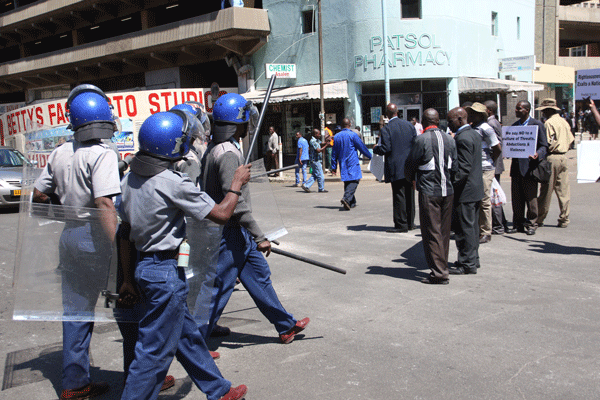
On Zimbabwe’s Independence Day, April 18, Alpha Media Holdings chief photographer Aaron Ufumeli was assaulted by police while on duty, taking pictures of events during the celebrations at the National Sports Stadium.
PAIDAMOYO MUZULU
He was attacked when police noticed that he was taking pictures of individuals who were being beaten by police and other security agents as they tried to force their way into the giant stadium.
Ufumeli says the attack shocked him as he least expected it. “The stadium was full but many people were still milling around trying to find ways of getting in. They were apparently eager to watch the football match between Dynamos and Highlanders, and they sought to take advantage of the arrival of the players’ buses. To me, that was a perfect photo opportunity,” he said.
“As I took photographs of the commotion at the main gate, some police officer struck me with a baton on my back and as I turned he hit me again on my left arm.”
Ufumeli was accredited to cover the event and had his licence tag clearly visible.
It is from incidents such as this one that Zimbabwe will tomorrow commemorate Media Freedom Day with a palpable sense of fear. The fear is compounded by the traditional trepidation that comes along with the arrival of elections. Zimbabwe holds its general elections next year.
The fear by the media is also based on the events in the past 12 months where arbitrary arrests and assault on journalists have spiked by 130%, according to Media Institute of Southern Africa Zimbabwe chapter. There is also the proposed new cyber law which seeks to further curtail media freedoms.
- Chamisa under fire over US$120K donation
- Mavhunga puts DeMbare into Chibuku quarterfinals
- Pension funds bet on Cabora Bassa oilfields
- Councils defy govt fire tender directive
Keep Reading
Media Alliance of Zimbabwe (MAZ) says the statistics of journalists arrested and beaten or tortured by the police in the past year were compiled by Misa-Zimbabwe in the State of the Media Report 2016.
“There was an upsurge of media violations, with at least 23 journalists being unlawfully arrested or detained in the last year,” MAZ said.
“The report notes that there were 12 journalists assaulted by either the police or by unruly political activists while professionally covering news events, translating to a shocking 130% and 71% increase in the number of journalists arrested and assaulted, respectively, while on duty.”
Only last week, police from the Law and Order section, summoned journalist representatives to their offices in a move which was interpreted as overt intimidation to the media.
Zimbabwe Union of Journalists secretary general Foster Dongozi, Zimbabwe National Editors Forum co-ordinator Njabulo Ncube, Voluntary Media Council of Zimbabwe director Loughty Dube and freelance journalist Privilege Musvanhiri were called in for questioning.
“We were called by the police and they were speaking in riddles, parables and building scenarios on what was likely to happen if something happened. They appeared to be on a fishing expedition,” Dongozi said.
“They invited us to discuss media ethics but when we got there, they demanded our business and residential addresses, mobile numbers and other personal information as if we were being accused of something,” Dongozi said.
Misa said it was wary of government intentions and lack of action to protect journalists from abuse.
“As the world commemorates World Press Freedom Day on May 3 this year, Misa Zimbabwe urges the government to ensure the proposed cyber-crime laws do not erode constitutional rights to free expression online and offline,” Misa said.
Government has tabled a draft bill that seeks to curtail media freedoms, particularly online. This apparently is reactive to the success of social media-propagated political protests in Zimbabwe, especially the national shutdown led by Pastor Evan Mawarire on July 6 last year.
The bill gives police wide discretionary search and seizure powers and access to data from social media gadgets – something that is not provided for in terms of the warrant issued by a magistrate.
“The envisaged offences should be clearly defined. This is critical where it pertains to what constitutes a computer system and pornography, for example, given the severity of some of the punishments of up to 20 years imprisonment without a fine,” Misa said.
“It is our well-considered view that some of the bill’s clauses, if not amended, infringe on fundamental rights to free expression and access to information. The other bills include the Data Protection Bill and Electronic Transaction and Electronic Commerce Bill.”
For now, the media has only but one option to continually engage the government for the safety of journalism and realignment of media laws to the new democratic Constitution adopted in 2013.










